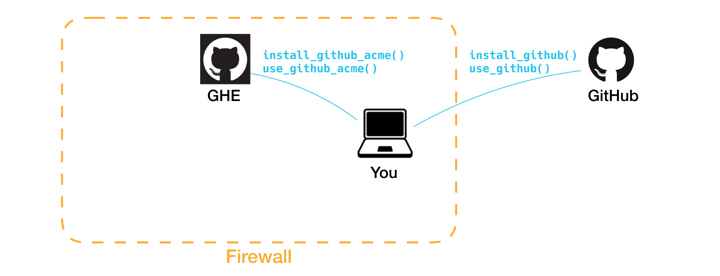The goal of this vignette is to show how you can use ghentr to make functions like install_github() for an institution-specific package to work with your instance of GitHub Enterprise.
Let’s assume you work at Acme Corporation and that Acme has an instance of GitHub Enterprise (GHE) behind its firewall. You would like to use your GHE as easily as you use GitHub, where you can use devtools::install_github() and usethis::use_github().

One way to do this is to create a package, perhaps called acmetools. In this package you can create analogous functions that you could use to access your GHE, as demonstrated in the figure above. You can create these functions using use_github_enterprise().
Usage
Create a package
If you don’t already have an institution-specific package, this is your invitation to create one.
# You may want to call your package something different,
# as well as specify a different path on your computer.
usethis::create_package("~/r-packages/acmetools")At this point, if you are using the RStudio IDE, a new RStudio project will open. Your subsequent work will be in this newly-created project.
Create functions
Before proceeding, you will need three pieces of information:
the
hostendpoint of your GHE instance - it might be something like"github.acme-corp.com/api/v3".a
suffixto use for function names - this puts the"acme"intouse_github_acme().a longer
namethat will be put into your functions’ documentation, such as"Acme Corporation".
With this, you are ready to create your functions:
ghentr::use_github_enterprise(
host = "github.acme-corp.com/api/v3",
suffix = "acme",
name = "Acme Corporation"
)This will create three R files:
utils-use_ghe.R, containinguse_github_acme()utils-install_ghe.R, containinginstall_github_acme()utils-ghe_pat.R, containinggithub_acme_pat()
As well, this will copy some text to your computer’s clipboard, which may be useful to add to acmetools’ README.
Finally, some packages are added to the Imports field of acmetools DESCRIPTION file: usethis and devtools.
Followup
Using the information you provided, ghentr writes out fully-documented functions in your newly-created files. You may wish to amend the documentation, then run devtools::document() when you are done.
As you know, devtools::install_github() uses a GitHub Personal Access Token (PAT), normally stored in an environment variable named GITHUB_PAT. Similarly, your function acmetools::install_github_acme() will look for an environment variable named GITHUB_ACME_PAT.
Accordingly, you (and anyone who would use acmetools) should get a PAT from the Acme GHE, then add it to your .Renviron file:
GITHUB_ACME_PAT="acme-pat-goes-here"Similarly, you may wish to add acmetools to the packages loaded when you start an interactive session, by adding to your .Rprofile:
if (interactive()) {
suppressMessages(require("devtools"))
suppressMessages(require("acmetools"))
}To distribute the acmetools package, you can suggest that people use devtools::install_github():
# install.packages("devtools")
devtools::install_github("<your-account-here>/acmetools", host = "github.acme-corp.com/api/v3")Once they have acmetools, they can use acmetools::install_github_acme() instead.
Alternatively, you could set up a CRAN-like repository using the drat package, then deploy it to be served from Acme’s GHE. Then, with a straightforward modification to your (or any of your Acme colleagues’) .Rprofile, you could use install.packages("acmetools"). This is the subject of this package’s repository vignette.
Behind the scenes
The functions created by use_github_enterprise() are wrappers to (or mimic) existing usethis and devtools functions.
Here is the code for acmetools::install_github_acme():
install_github_acme <- function(repo,
username = NULL,
ref = "master",
subdir = NULL,
auth_token = github_acme_pat(quiet),
host = "github.acme-corp.com/api/v3",
quiet = FALSE,
...){
devtools::install_github(
repo,
username = username,
ref = ref,
subdir = subdir,
auth_token = auth_token,
host = host,
quiet = quiet,
...
)
}As you can see, this function calls devtools::install_github() while changing argument-defaults to conform to Acme’s GHE.
The same idea is used in acmetools::use_github():
use_github_acme <- function(organisation = NULL,
private = FALSE,
protocol = c("ssh", "https"),
credentials = NULL,
auth_token = github_acme_pat(),
host = "https://github.acme-corp.com/api/v3") {
usethis::use_github(
organisation = organisation,
private = private,
protocol = protocol,
credentials = credentials,
auth_token = auth_token,
host = host
)
}Finally, acmetools::github_acme_pat() mimics devtools::github_pat():
Windows 7 and SSH
We found it difficult to use Windows 7 with SSH - this would be applicable to usethis::use_github() as well as acmetools::use_github_acme(). It is possible that this problem is confined to our particular corporate load of Windows. Anyhow, we wrote up our set of workarounds.